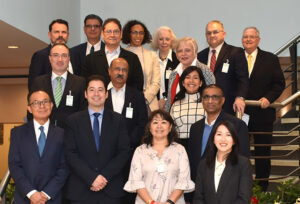Green Trade a Top Issue at WCO's PSCG Meeting
AAEI participated in last week’s Private Sector Consultative Group meeting in Brussels, where Green Trade and Green Customs were top issues on the agenda. Donna Thresher, of C.H. Robinson, who co-chairs AAEI’s Export and Global Trade Compliance Committee, represented AAEI at the meeting. Donna reports that other top issues included possible enhancements to Authorized Economic Operator (AEO) programs, and a focus on how to better measure the effectiveness of current AEO’s globally. Donna also attended the World Customs Organization’s (WCO’s) SAFE work group meeting. The SAFE Framework of Standards to Secure and Facilitate Global Trade is a set of standards that promotes the use of modern customs techniques and technologies to secure and facilitate global trade. The PSCG was established by the WCO Council in June 2005. Donna will provide AAEI members with a detailed update at the next meeting of AAEI’s Export and Global Trade Compliance Committee. Not an AAEI member yet? Click here for more information.
Donna Thresher, of C.H. Robinson, who co-chairs AAEI’s Export and Global Trade Compliance Committee, represented AAEI at the meeting. Donna reports that other top issues included possible enhancements to Authorized Economic Operator (AEO) programs, and a focus on how to better measure the effectiveness of current AEO’s globally. Donna also attended the World Customs Organization’s (WCO’s) SAFE work group meeting. The SAFE Framework of Standards to Secure and Facilitate Global Trade is a set of standards that promotes the use of modern customs techniques and technologies to secure and facilitate global trade. The PSCG was established by the WCO Council in June 2005. Donna will provide AAEI members with a detailed update at the next meeting of AAEI’s Export and Global Trade Compliance Committee. Not an AAEI member yet? Click here for more information.
APEC Members Call for WTO Reform
More than 20 countries at the Asia-Pacific Economic Cooperation (APEC) forum last week renewed their call for reform at the World Trade Organization (WTO). The event followed a meeting of members of the Indo-Pacific Economic Framework (IPEF), which failed to agree on trade-related issues, despite its intent to be an alternative to China’s trade influence. The setback prompted Republican presidential candidate Donald Trump to announce that if he is re-elected, he would block any Pacific trade pact being pursued by the Biden Administration. Read more from Reuters.
Manufacturers and Importers Call for MTB Refunds
More than 200 companies and business groups wrote a letter to House and Senate leaders last week, urging them to pass a Miscellaneous Tariff Bill (MTB) refunding tariffs paid since the start of 2021 and extending relief until 2026. The MTB “temporarily reduces or eliminate[s] tariffs on products that are not available in the U.S.” and expired in December of 2020. Since then, the letter says, manufacturers and businesses have paid more than $1.4 billion in anti-competitive tariffs. Read the letter.
CBP Announces Next COAC Meeting: Dec. 13, 2023
The Commercial Customs Operations Advisory Committee (COAC) is set to convene next on December 13, 2023 both remotely and in Washington, DC. The meeting, as announced by US Customs and Border Protection (CBP) yesterday, will include updates from subcommittees and discussions on a variety of topics. Comments are due in writing by Dec. 8. For more information about the meeting, read the announcement.
USTR to Hold Public Hearing on USMCA Automotive Trade
The Office of the U.S. trade Representative (USTR) announced today that it will hold a public hearing on the operation of the US-Mexico-Canada (USMCA) agreement with respect to trade in automotive goods. The announcement includes a request for comments. The hearing and comments will address whether the automotive provisions of the USMCA are effective in light of technological and production advances. The hearing will be held on Wednesday, February 7, 2024, in Washington, DC. Written comments are due on Wednesday, January 17, 2024. AAEI members will discuss the issue at next week’s meeting of AAEI’s Automotive & Aerospace Committee. Read USTR’s notice.
Senators Urge White House to Maintain Section 232 and 301 Tariffs
In a letter to the White House yesterday, Senators Sherrod Brown (D-OH) and Bob Casey (D-PA) raised concerns about potential reductions in Section 232 and 301 tariffs. The senators urged the Biden Administration to maintain these tariff regimes, citing concerns that tariff reductions could enable China and other global competitors to resume anti-competitive activities without consequences. The senators highlighted a USTR report showing growth in domestic industries due to these tariffs, such as a 7.5% increase in furniture manufacturing and a 5% rise in domestic steel production from Section 232 tariffs. Read the letter.
CBP Designates China as Lexmark Printers' Country of Origin
China was designated as the country of origin for Lexmark printers in a recent ruling by US Customs and Border Protection (CBP). Although the circuit boards were assembled in Mexico, CBP found that the components that “impart the essential character” of the printers, including the laser scanning unit and the power supply unit, were made in China. The ruling affects various Lexmark printer models, including monochromatic and color multifunction machines. For more details, read the customs ruling.

